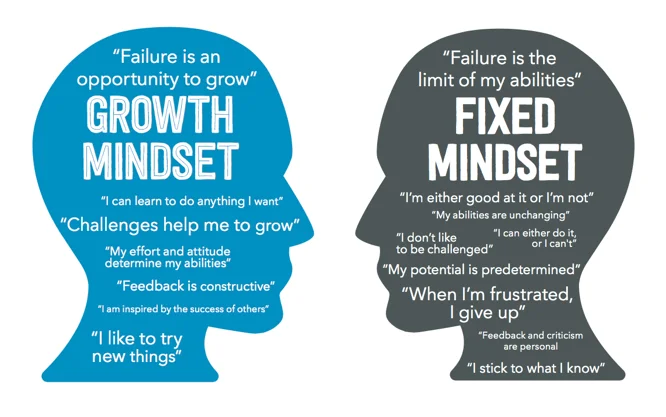Hello!
A person’s mindset has a big impact on their lives and the way they deal with different situations. Team leaders need to be able to deal with a variety of different situations daily, and a strong mindset can make a great difference. But ? And which is better for team leaders?
 Throughout our guide below, we highlight the key features of these mindsets in relation to team leadership and answer these key questions in detail to help you assess how your mindset may be impacting your management.
Throughout our guide below, we highlight the key features of these mindsets in relation to team leadership and answer these key questions in detail to help you assess how your mindset may be impacting your management.
People with a fixed mindset believe that their talents and abilities are simply fixed traits. They have a certain amount and that’s that, and they can’t really do much about it. A fixed mindset can be useful if you’re secure in your strength and abilities; however, it can also create problems, especially in the workplace.
Instead of putting everything into reaching your potential, you may hold yourself back because you don’t want to appear too ambitious or show others that you think you’re better than they are. For some people with a fixed mindset, the fear of failure can lead them not to even try at all — even if success may be within their reach — because they might fail.
What is a Growth Mindset?
In contrast, in a growth mindset, people believe that talents and abilities can be developed through hard work, good strategies, and mentorship. They know that although they aren’t perfect, with effort, they can reach their goals.
People with a growth mindset understand that even geniuses have to work hard for their achievements and don’t give up in the face of setbacks — because they know that failure is just an opportunity to learn something new while helping them get closer to their desired outcome.
How Do These Mindsets Apply to Team Leadership?
 So how can you apply all of these things to your daily life as a leader of a team? Well, there are some examples out there like Mark Zuckerberg (Founder of Facebook) or Elon Musk (Founder of Tesla) that have a fixed mindset. They believe that they are the best at what they do and the only one out there with all the answers.
So how can you apply all of these things to your daily life as a leader of a team? Well, there are some examples out there like Mark Zuckerberg (Founder of Facebook) or Elon Musk (Founder of Tesla) that have a fixed mindset. They believe that they are the best at what they do and the only one out there with all the answers.
On the other hand, there are leaders like Bill Gates — Founder of Microsoft — who is the definition of a growth mindset. He shares his knowledge and mentorship with others to help drive his business and team forward. He never stops learning, growing, or sharing knowledge because he knows that without it there is no future for the company.
Mindset is key when it comes to leadership. It helps make the right decisions, understand your strengths and weaknesses, and to inspire others.
How Can Team Leaders Manage Different Mindsets?
 Assessing employees:
Assessing employees:
- Assessing Employees For a Fixed Mindset: Some indications that an employee has a fixed mindset could include: hiding their mistakes because they don’t want to be seen as a failure, burning out easily, not putting much effort into assignments that they’re not certain about, being more likely to compare themselves with others, or alternatively having strong confidence in their abilities, but having a hard time admitting that they’re wrong.
- Assessing employees for a growth mindset: Signs of a growth mindset could include embracing criticism because they know that it will help them learn and grow, following up on the progress of a project before their deadline because they’re always working hard to do their best, valuing knowledge-sharing and mentorship because they know it’s what success is made of, and trying to find new ways to be successful even if their first solution didn’t work.
 Managing employees:
Managing employees:
- Managing employees with a fixed mindset: How you might manage an employee with a fixed mindset is by providing them with opportunities to learn new skills and have some positive feedback on their work. Letting them know that they are doing a good job at things they enjoy will help keep them motivated, as long as you don’t set unrealistic expectations for growth or fail to provide clear consequences when the performance is not up to par.
- Managing employees with a growth mindset: With employees that have a growth mindset, the main thing is to keep them motivated and get out of their way because they are self-directed enough to figure out what they need to do in order to be successful. Providing constructive feedback on their progress will help them learn to grow.
 Leading by example:
Leading by example:
- Leading by example with a fixed mindset: Someone with a fixed mindset may be more likely to require credit for the benefits of their hard work and will value recognition. They will highlight specific instances of success as opposed to taking a step back and focusing on patterns. To effectively lead by example with a fixed mindset, you want to make sure that you share the credit for your accomplishments, highlight your relationships with others over any singular success, and focus on how you can improve instead of mentioning where you are already good at.
- Leading by example with a growth mindset: Someone with a growth mindset is more likely to give credit where it’s due. If they fail, they won’t dwell on it or hold a grudge against the people who helped them achieve their success. They pay attention to patterns so they can figure out where their mistakes are and how they can grow. To lead by example with a growth mindset, you want to focus on sharing credit for success, encouraging teamwork towards improvement, and learning from your failures instead of just dwelling on them or throwing blame around.
Fixed vs Growth Mindset: Which is Better For Team Leaders?
As we have highlighted, both types of mindsets have their benefits and setbacks, but what about when you’re a leader? What type of mindset should you have in order to effectively lead a team?
 Well, for a team leader with a fixed mindset, it can be a big personal advantage to have. They know they have the upper hand when it comes to experience and knowledge in their field or specific area of expertise, but this might mean that they feel comfortable keeping this information to themselves and not giving others many opportunities for growth or development.
Well, for a team leader with a fixed mindset, it can be a big personal advantage to have. They know they have the upper hand when it comes to experience and knowledge in their field or specific area of expertise, but this might mean that they feel comfortable keeping this information to themselves and not giving others many opportunities for growth or development.
A person with a fixed mindset who is in charge of a team may also struggle with showing favoritism to certain team members or employees they are more comfortable with while overlooking other potential key players to the success of the company.
A person with a growth mindset can make a great team leader because they understand that their employees can also grow and learn from some of their mistakes or misfortunes. They let everyone have opportunities to shine, without looking down on anyone because of the lack of experience.
However, a team leader with a sole growth mindset could have some potential consequences if they are too focused on improvement, often neglecting the personal lives of their employees or losing sight of what is important.
Really, the best team leaders will have a combination of both mindsets. They will be open to new opportunities and challenges, while also understanding how dangerous it can be to give others total power over them or their work.
How Can I Improve My Leadership Mindset?
Great team leaders will always strive to improve themselves and be the best versions of themselves that they can be, whether this means changing specific behaviors or thinking patterns. However, there are steps you can take to start with your mindset and begin working on improving your leadership skills.
 To be a better team leader, you should ask yourself a few questions:
To be a better team leader, you should ask yourself a few questions:
- Do I have a growth mindset or a fixed mindset?
- What type of people have I been managing in the past and where did they succeed or fail?
- How do my employees perceive me as a person and how can I work on improving that perception?
With those questions in mind, a team leader can take a step back and examine their strengths and weaknesses as both a person and a leader. This enables them to lead by example with both mindsets so they have the best chance possible of being successful as a team.
Also read: Harvard Rolls Out Free AI and ML Courses for 2025
Final Thoughts on Which is Better For Team Leaders: Fixed vs Growth Mindset
 As we have seen, no one mindset alone is better than the other, though for leadership a growth mindset can benefit more of the team. We all have strengths and weaknesses, but with training and practice, anyone can learn how to adapt their mindset to be the best version of themselves in whatever they are involved in.
As we have seen, no one mindset alone is better than the other, though for leadership a growth mindset can benefit more of the team. We all have strengths and weaknesses, but with training and practice, anyone can learn how to adapt their mindset to be the best version of themselves in whatever they are involved in.
Team leaders can use their different types of mindsets when managing employees to make the most out of every member on the team, while also leading by example and making sure they practice what they preach. No one ever said it would be easy, but with some hard work and dedication, anyone can be a great team leader.
Thank you!
Subscribe to our newsletter! Join us on social networks!
See you!






